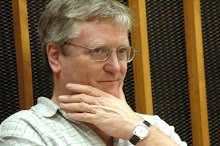Last Friday at Nottingham Playhouse we talked to Pristina.
While in Pristina they read extracts from four plays by Nottingham writers, Andy Barrett, Michael Pinchbeck, Amanda Whittington and me, in the Neville studio we saw rehearsed readings of plays by Doruntina Basha, Ilir Gjocaj, Arian Krasniqi and Jeton Neziraj. Then, through Skype we were able to meet each other and discuss the work we'd seen.
In the UK we had all dealt in some way with the experience of the refugee and conflict, in Kosovo they lived it first hand. That word 'conflict', we've heard it so much, 'the conflict in the Middle East', 'the conflict in the Balkans', We all use it and they were right to call us on it.
Very politely,and very correctly, we were made to realise that 'conflict' has as little reality as 'collateral damage', or the infamous ' terminated with maximum prejudice' for those who live the reality.
'Please don't call what we had over here a conflict,' asked Jeton Neziraj, ' a conflict sounds like a minor dispute between two cities, an argument, we had a war.'
All the four plays from Kosovo dealt with different aspects of the war. They felt that only recently were they able to speak of the war in their work in anything other than direct terms because the pain was too immediate for any other approach. We saw a shift in this approach in three of the plays - The Demolition of the Eiffel Tower by Jeton Neziraj and The Finger by Doruntina Basha and Iphigenia's Doll by Arian Krasniqi. Even a small amount of distance had allowed these writers used metaphor and humour as an alternative to tackling the subject head on.
It was a powerful evening. Funny, moving, exciting. The work was serious. The discussion was good humoured and light. Appropriately It broke up when it was decided it was time to go to the bar. We hope we can continue to develop our new friendship with our collagues in Kosovo. Find ways to make a more substantial exchange of work. Maybe through the next NEAT festival. Who knows? But you know when you meet people you'd like to work with somehow you're going to look for ways to make it happen.
One of Jeton's questions stayed with me. 'All your plays dealt in some way with the bad experiences that immigrants have when they get to the UK. So this something that is being talked about in your theatre. Does this mean that the theatre in the UK has changed the way the government thinks and acts?' I wish I could have answered yes.
Subscribe to:
Post Comments (Atom)

No comments:
Post a Comment